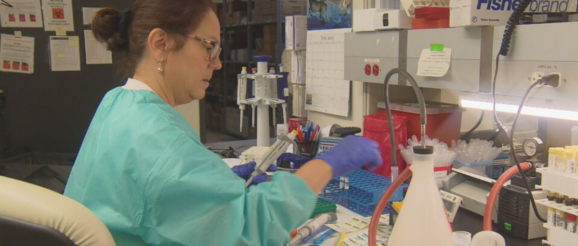RheumaGen at Fitzsimons Innovation prepares to test promising gene therapy for rheumatoid arthritis – CBS Colorado

The Fitzsimons Innovation Community in Aurora was created to bring medical breakthroughs to market. The life sciences hub north of Anschutz Medical Campus is expected to employ thousands of people at full buildout.
Now, a company called RheumaGen is using gene-editing technology in hopes of revolutionizing the field of auto-immunity.
It was at the Clinimmune lab at the University of Colorado Anschutz Medical Campus where scientists discovered they could edit a gene to make it resistant to auto-immune disease.
Brian Freed, PhD F(ACHI), the Executive Director of ClinImmune Cell and Gene Therapy, said, “So it’s really like plastic surgery on the immune system.”
ClinImmune is a nonprofit biotech company in CU’s Department of Medicine.
The lab has facilitated genetic matching for patients who need organ or bone marrow transplants for more than 20 years and generates some $20 Million in annual revenue.
Researchers say they are about 18 months away from starting clinical trials on a treatment for the most common autoimmune disease, rheumatoid arthritis (RA), which affects about one percent of the world’s population.
It’s estimated some 35,000 Coloradans have RA.
Dr. Freed said, “A patient who normally wouldn’t be receiving a bone marrow transplant is going to get their own bone marrow back, with a slight edit to it.”
An animation video provided by RheumaGen states, “Doctors change a single DNA marker of the HLA gene, also known as the immune gene.”
RheumaGen Co-Founder Brian Hart is on a personal mission to advance this science. He told us, “My mom has suffered from rheumatoid arthritis for over 25 years.” Hart’s brother Ryan Hart is the company’s legal officer.
Hart remembers the impact on his family when as a teenager, his mom Nan Hart began to develop RA. It’s influenced the trajectory of his career.
Hart said, “Many patients out there are like my mom. And they have families and they have situations where it’s affecting their quality of life.”
Hart says the work to bring the therapy to market would not have been possible without the labs and infrastructure at Anschutz.
These include a lab where gene edits are made, and a cryofreezer facility storing one of the largest collections of umbilical cord blood in the world.
“The environment that the University of Colorado has created here at the Anschutz Medical Campus for innovation and for partnering with companies is outstanding,” Hart added.
RheumaGen has licensed its technology and is developing it into therapies for other autoimmune diseases including multiple sclerosis and type one diabetes.
The University of Colorado has a five percent stake in RheumaGen. The company filed an FDA INTERACT document this past spring, and received positive initial feedback from the Food and Drug Administration. The plan is for the first clinical trials in RA to begin in early 2025.
